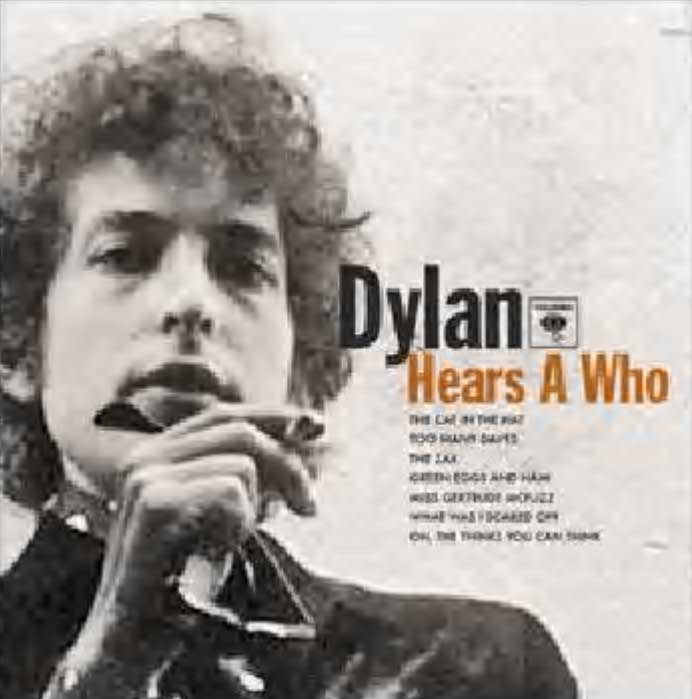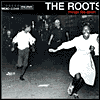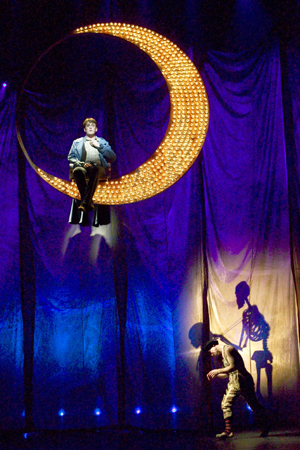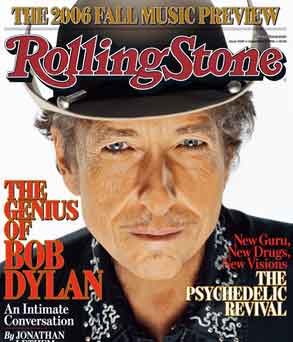I grow; I prosper: Now, gods, stand up for bastards! As you may or may not know, both Battlestar Galactica and Slings and Arrows end their third seasons tonight. All in all, a solid evening of quality television…Get thee hence to the Tivo, so say we all. Update: There‘s too much confusion, Saul can’t get no relief? Ok, that’s just plain bizarre. Update 2: FTL Jump the Shark? In case you skipped the comment thread, Ron Moore talks about last night here, and seems to confirm the goofiest aspects of the Season 4 finale. Huge spoilers if you haven’t watched yet.
Category: Bob Dylan
Seuss Gave Names to All the Animals.

It doesn’t seem to play nice with Internet Explorer at all, but this parody mash-up, Dylan Hears a Who: Seuss via Zimmerman — sent via my sister Tes — is definitely worth checking out. The joke aside, whoever put this together did a great job of capturing that vintage Dylan sound — I particularly like the “Ballad of a Thin Man”‘ed up version of “Miss Gertrude McFuzz,” but all seven tracks are surprisingly catchy and on point. Huzzah.
Love Songs ’07.
Oof, Valentine’s Day. Not a holiday I’ve been looking forward to of late, even if it does provide the chance to write up some favorite songs here, as per recent tradition. As many of y’all surely know, V-Day and all the attending hoopla is rarely much fun when you’re single, and it’s even worse when you’re walking wounded, as I’d number myself these days. To wit: Late last year, I got kicked right in the teeth by someone I was really fond of, and even though it’s been many months now since it all went down — long enough that I really should’ve just gotten over it and moved on — most days since then are sadly still kind of a struggle.
But, oh well…no hope, no harm, just another false alarm. I’ve loitered on the Injured List before — in fact, you could say much of my adult romantic life has been Grant Hillish to the extreme, all burgeoning potential cut short by season-ending injuries — so I’m pretty sure, at an intellectual level if not yet a gut one, I’ll get back in the game someday. In the meantime, here’s some music for ya. Usual rules apply: the files will be only up for a few days, right-click to save them, and please don’t link to them directly.
things fall apart, and tend to shatter
she like that s**t don’t matter
when I get home get at her
through letter, phone, whatever
let’s link, let’s get together
s**t you think not, think the Thought went home and forgot?”
For all the genre’s many strengths, the slice-of-life relationship song isn’t normally what you’d consider a central feature of hip-hop. Cuts like Method Man’s “All I Need,” Outkast’s “Mrs. Jackson,” or the Tribe’s “Bonita Applebaum” notwithstanding, shake-your-booty jams and odes to the playa lifestyle outnumber romantic ditties by at least five or six to one. “You Got Me,” from the Roots’ 1999 album Things Fall Apart, numbers among the exceptions.
Co-written by Jill Scott (who performed the song in Dave Chappelle’s Block Party and on tour for the Roots) and co-sung by Eykah Badu (on the original cut and video), “You Got Me” is a story of a meet-cute (“We used to live in the same building on the same floor and never met before until I’m overseas on tour“) that grows into a relationship that works despite the odds (“When you out there in the world, I’m still your girl“), and despite the loose talk all around. (“Lies come in, that’s where the drama begins.“)
It ain’t easy for the couple in “You Got Me,” but they’re making do. They got each other, and most of the time, that’s enough to get by. (And bonus points for ?uestlove’s infectious drum-and-bass outro — our time with this pair ends with the fade, but their story clearly continues.)

You Got Me — The Roots feat. Erykah Badu (3.9MB, 4:19)
(song removed)
From Things Fall Apart.
[Update:]
Relationships have all been bad.
Mine’ve been like Verlaine’s and Rimbaud.
But there’s no way I can compare
All those scenes to this affair,
Yer gonna make me lonesome when you go.“
I picked a Bob Dylan song last year (“Most of the Time”), and I freely admit that, however brilliant, Blood on the Tracks is now one of the hoariest of breakup-album cliches. Still, “You’re Gonna Make Me Lonesome When You Go” was on my mind a lot over the past year (see also my review of The Fountain), so it’s going up anyway (and, hell, maybe I’ll pick a Dylan song every Valentine’s Day from now on — he’s got enough to go around.)
Here, unlike most of the cuts on the album, Bob is actually happy (“I could stay with you forever and never realize the time.“) — Life is good to him, he’s got a good woman by his side. But, though he’s ignoring it, the insurmountable problem — “the crystal…in the steel at the point of fracture,” to borrow a phrase from All the King’s Men — is already manifest, a tiny speck on the horizon soon to loom over everything. Despite his euphoria, Dylan can already recognize that this relationship is finite: Eventually, “Yer gonna have to leave me now, I know.” So, Dylan listens to the crickets and the river instead, and does his best to relish what happy moments still lie ahead, before the axe inevitably falls.
(Everybody and their brother owns Blood on the Tracks — if you don’t, buy it! For you and your brother! — so I’ve also thrown in a cover version by Mary Lou Lord. It’s a bit alt-chickish, sure, but I prefer it to other versions I can name, such as Elvis Costello’s too-jaunty-by-far take on Kojak Variety.)

You’re Gonna Make Me Lonesome When You Go — Bob Dylan (2.8MB, 2:55)
(song removed)
From Blood on the Tracks.

You’re Gonna Make Me Lonesome When You Go — Mary Lou Lord (5.3MB, 3:46)
(song removed)
From Hard Rain: A Tribute to Bob Dylan, Vol. 1.
[Update:]
And if you want a doctor, I’ll examine every inch of you.
If you want a driver, climb inside
Or if you want to take me for a ride,
You know you can…
I’m your man.“
Canada’s answer to Dylan, the inimitable Leonard Cohen has also been mining the joys and perils of romantic entanglements for four decades now. To be honest, I’m hit-or-miss with his early stuff, but I just can’t get enough of his “Satan’s lounge act” later period. (As I’ve said before, and as with Dylan, Tom Waits, etc., I’m basically a sucker for the “broken, gravelly voices with tales to tell” genre.)
Like “Everybody Knows” and “First We Take Manhattan,” “I’m Your Man” is one of the better-known songs from Cohen’s later incarnation (and the name of a recent tribute documentary to him, which I haven’t seen.) “I’m Your Man” combines a lot of Cohen’s strengths — that debauched, plaintive, and world-weary croak, a knack for memorable imagery and earthy allusions (even at his most bathetic, Cohen never lets you forget there’s a primal beast that “won’t go to sleep” raging inside him, one with carnal appetites inseparable from his professions of love — see also “In My Secret Life,” “Waiting for the Miracle,” or countless others), and a second-act twist that complicates what initially seemed to be a straightforward pop ditty.
Here, what appeared to be a confident ode to that special gal in his life becomes instead a hail-mary plea for forgiveness. (“I’ve been running through these promises to you, that I made and I could not keep“), one that he already knows is not going to shake out as he desires (“A man never got a woman back, not by begging on his knees…“) The joke is, Cohen’s not her man anymore. No matter how many times he says otherwise or tries to contort himself to regain his muse’s affections, Cohen is stuck being himself, the guy who blew it somewhere along the line. Sorry, Leonard. At least you got Manhattan.
(song removed)
From I’m Your Man.
[Update:]
‘There’s too much caffeine
In your bloodstream
And a lack of real spice
In your life’
I said :
‘Leave me alone
Because I’m alright, dad
Surprised to still
Be on my own.’
Oh, but don’t mention love
I’d hate the strain of the pain again…
Since I already lyric-checked the Smiths earlier in this post, why not go straight to the source? Maybe they just captured a certain zeitgest of feeling alone, different, and melancholy in the Reagan-Thatcher era. Still, the Smiths have a lot to answer for their part in helping to fashion a generation of angst-ridden, self-absorbed romantics (in which I include myself.) Either way, nobody does “way over yonder in the minor key” quite like Morrissey, Marr, & co., who built an entire career on the twisted, solipsistic pleasure one comes to take in excessive moping.
What the Smiths perfectly capture in song after song is the narcissism of the whole enterprise. With all the horrible things happening in the world every day to people who don’t deserve them, it takes no small amount of self-absorption and lack of perspective to luxuriate in a slough of despond for weeks on end. And yet, we all do it all the time, dwelling on our own petty problems while the world seems to crash and burn — it’s virtually inescapable.
In “A Rush and a Push and the Land is Ours,” probably my favorite Smiths song (well, along with “This Night Has Opened My Eyes”), the band brings this irony front and center. In the lyrics’ biting condescension even in the midst of gloom (“people who are uglier than you and I, they take what they need and just leave“), in the vague disreputability of the land-grab metaphor at the heart of the song (“A rush, a push, and the land that we stand on is ours! It has been before, so why can’t it be now?“), and in Morrissey’s trademark wailing, swooning, and growling, “A Rush, A Push, and the Land Is Ours” captures both the varied emotions and uglier facets of heartache that will attend all too many of us this holiday Wednesday. (Also, courtesy of Youtube, here’s what appears to be the vintage video.)
(song removed)
From Strangeways, Here We Come.
However you stand on this Valentine’s Day, have a safe and a happy one out there, as always. (And, as I noted last year, if you want more music, Fluxblog does the mp3blog thing day in and day out, and is considerably better at it than I am. And Max of Lots of Co. offers choice dance/techno/pop mixes around the start of every month.)
Play a Song for Me.
The freewheelin’ Bob Dylan has a lot to answer for in this intermittently amusing Post Show send-up of Dylan’s No Direction Home. Admittedly, this guy’s singing-Bob impression is pretty funny. (By way of Tes.)
Distant Thunder.
“The pistols are poppin’ and the power is down, I’d like to try somethin’ but I’m so far from town…” Ok, I’ll admit it — I reupped for more time, to catch up on political news. And, while doing so, I discovered that Slate, of all places, is not only premiering Bob Dylan’s new video for Thunder on the Mountain, which is chock-full of vintage Dylan footage, but offering a chance to win a guitar signed by the man himself. Cool…but is it strung lefty?
Cate’s in the Well.
Found while looking for an online version of the recent Rolling Stone story on Todd Haynes’ I’m Not There (which includes a shot of Cate Blanchett as the Blonde on Blonde-era Dylan), writer Jonathan Lethem picks out some forgotten Dylan gems as a sidebar to his recent cover story on Modern Times.
Going to the carnival.
So, my sister, her boyfriend, and I went to check out The Times They Are A-Changin’, the new Twyla Tharp-choreographed reimagining of famous Bob Dylan songs, last Thursday (with, as a star-gazing aside, some heavy-hitters in attendance: Annie Leibowitz sat directly in front of me, and Tharp herself sat directly behind. Yes, I’m a celebrity hound.) And the verdict? Well, first let me say, that — some early dabbling in community-theater notwithstanding — I’m really not much of a musical guy. I tend to find the American Idol-ish histrionics of Broadway singing really distracting, and particularly when the song in question is something like “Masters of War.” Nor have I seen Moving Out, Mamma Mia!, Ring of Fire, Almost Heaven or any of the other “Broadway Karaoke” shows that currently seem to be the rage, so I can’t really compare it to any of the others — I was really more interested to see some intriguing interpretations of Dylan than I was to partake in a group sing-a-long (which, thankfully, Times is not.) With all that said, I found Times to be…kinda hit-or-miss. While some of the visions here do their source material justice in memorable fashion, others fall flat or just seem ill-conceived. And, while the circus acrobatics on display are amazingly well-performed and at times mesmerizing, too many numbers slip into the same dark carnival-of-the-absurd pattern. The cast works hard, but surely, when you get down to it, there is more to Dylan’s oeuvre than just aggro carny folk.
To its credit, Times samples songs from across Dylan’s career, from the hoary (“The Times They-Are A Changin’,” “Blowing in the Wind“) to the obscure (“Man Gave Names to All the Animals,” “Please, Mrs. Henry“), through the lean years (“I Believe in You,” “Dignity“) and up to the recent critical revival (“Not Dark Yet,” “Summer Days.”) Set in a traveling circus run by the vicious, heavy-handed Captain Ahrab (Thom Sesma) — a character from one of Dylan’s great American fables,”Bob Dylan’s 115th Dream,” not included — the play basically centers around a love triangle among Ahrab, his son Coyote (Michael Arden), and the lady Cleo (Lisa Brescia), one of the circus performers. Through their story — and the larger tale of a power struggle over the circus — are refracted these thirty or so Dylan tunes, strung togther in haphazard but decently compelling fashion.
I’d like to say there’s a formula for when a song works and when it doesn’t, but it doesn’t go over like that. One of the two best numbers, “Simple Twist of Fate” (the only cut from Blood on the Tracks here), is played basically straight. Alone in spotlight, Ahrab sings wistfully in the foreground (as seen at left) while the younger couple cavorts behind him, a haunting memory. “He woke up, the room was bare. He didn’t see her anywhere. He told himself he didn’t care, pushed the window open wide. Felt an emptiness inside, to which he just could not relate.” The bleak, melancholic staging matches the song perfectly, and Ahrab/Sesma channels both its poetry and its pain.
But, in the other most successful number, “Mr. Tambourine Man” (a song I can usually take or leave), Tharp & co. have taken a tune that’s ostensibly about a drug deal and just ran with it. Now, it’s a gripping, Bergmanesque dance of death, with one of the sadder clowns (Charlie Neshyba-Hodges) holding center stage as the ensemble circles around him in black, recalling the doomed pilgrims of The Seventh Seal. Obviously, Tharp isn’t the first to read “Tambourine Man” as a disquisition on mortality. (“I’m ready to go anywhere, I’m ready for to fade…into my own parade, cast your dancing spell my way, I promise to go under it.“) Nevertheless, the staging both feels innovative and cuts close to the bone of the song in surprising fashion.
There are other good moments scattered throughout the show, although few that hold their power over the course of an entire track: For example, a contortionist writhes horribly on a hospital bed during the “Dr. Filth” passage of “Desolation Row,” flashlights whirl and twirl (held by people brandishing them vaguely like tusken raiders) during “Knocking on Heaven’s Door“, the cast memorably get their drink on for “Please, Mrs. Henry,” and one clown reenacts Dylan’s “Subterranean” signage during the latter half of “Like a Rolling Stone.”
But, when a song’s off, it’s pretty off. The most obvious offenders are “The Times They Are A-Changin’,” “Blowing in the Wind,” and arguably “Lay, Lady, Lay,” all of which are performed in a deadly earnest Broadway patter that just stop the show dead. (This is particularly unfortunate in the case of the first one, since that’s how the show begins.) But, there are other problems. The bizarre welcome-to-the-carnival-of-beasties routine works well for “Desolation Row” (since, after all, “The circus is in town“) and maybe even for other rousing numbers such as “Like a Rolling Stone.” But, it’s overdone — in “Highway 61 Revisited,” “Everything is Broken,” “Gotta Serve Somebody,” “Rainy Day Women #12 & 35” — to the point that the musical numbers become indistinguishable. (“Masters of War” also falls somewhat into this pattern — I liked it better than most, but was reminded more of ABT’s splendid recent revival of “The Green Table,” which captured the same sentiment better.)
And, sometimes, in my humble opinion, the attempted interpretation falls flat on its face. I thought turning “Not Dark Yet,” Dylan’s gloomy but resigned rumination on death around the corner, into a rage-against-the-dying-of-the-light completely misses the point of the song, which is that he’s given up and given in to the coming darkness. (“I’ve been down on the bottom of a world full of lies. I ain’t looking for nothing in anyone’s eyes.“)
Most egregious in this regard is what’s been done to “Don’t Think Twice, It’s Alright.” Perhaps because it remains such a personal song — a song about two people rather than a generation — I’d say it’s aged much better than almost all of the other hugely popular early-Dylan standards (“Blowing in the Wind,” “The Times They Are A-Changin’,” “A Hard Rain’s A-Gonna Fall.”) In fact, I might go so far as to say that “Don’t Think Twice” may just be the quintessential Dylan break-up song in a career full of them (although now that I write that…Blonde on Blonde, Blood on the Tracks…ok, never mind. That’s too bold a statement.) At any rate, here, all the complexity of competing emotions that drives the track — “I ain’t sayin’ you treated me unkind, you could have done better but I don’t mind, you just kinda wasted my precious time” — is wasted, as it’s become, inexplicably, a number sung by a woman to her overly eager dog. (Although I will concede that the canine in question — I believe it was Jason McDole — was convincingly and creepily Berkeley-like.)
In sum, A Times They Are A-Changin’ is at times engaging, and may be worth catching if you have a hankering for the carnivalesque, if you’re a Dylan completist, or if you have a higher tolerance for showtune renditions than I do. But, as an exploration of Dylanalia, I found the show too narrowly circumscribed within its three-ring circus, and ultimately unsatisfying. (Then again, in the play’s defense, I didn’t think much of Masked and Anonymous either, so perhaps I’m just ornery about such things.)
Gotta Serve Somebody.
As part of his Modern Times publicity blitz, Bob Dylan hawks iPods in a new commercial. Call him a sell-out, but, hey, things have changed. And besides, I have no real problem with iPods…or lingerie, for that matter. And, also in recent Dylanalia, Louis Menand reviews Bob Dylan: The Essential Interviews for The New Yorker (courtesy of Ralph Luker at Cliopatria.)
Ragged & Dirty.
“I hate to break it to Justin Timberlake, but a wheezy old man has recorded the best make-out songs of 2006. Put Modern Times in the CD player, pull your sweetheart close, and — as a young man advised a lifetime or so ago — shut the light, shut the shade.” Also in Slate, Jody Rosen swoons over Bob Dylan’s new album, which I’m listening to for the first time right this minute. So far, it sounds like a more accessible version of Love and Theft…I think I kinda dig it.
Pre-Modern Balladeer.
“What we do understand, if we’re listening, is that we’re three albums into a Dylan renaissance that’s sounding more and more like a period to put beside any in his work. If, beginning with Bringing It All Back Home, Dylan garbed his amphetamine visions in the gloriously grungy clothes of the electric blues and early rock & roll, the musical glories of these three records are grounded in a knowledge of the blues built from the inside out…Dylan offers us nourishment from the root cellar of American cultural life. For an amnesiac society, that’s arguably as mind-expanding an offering as anything in his Sixties work. And with each succeeding record, Dylan’s convergence with his muses grows more effortlessly natural.” In the new Rolling Stone and on the eve of Modern Times (due out this Tuesday), author Jonathan Lethem interviews Bob Dylan. (Via Ed Rants.)




